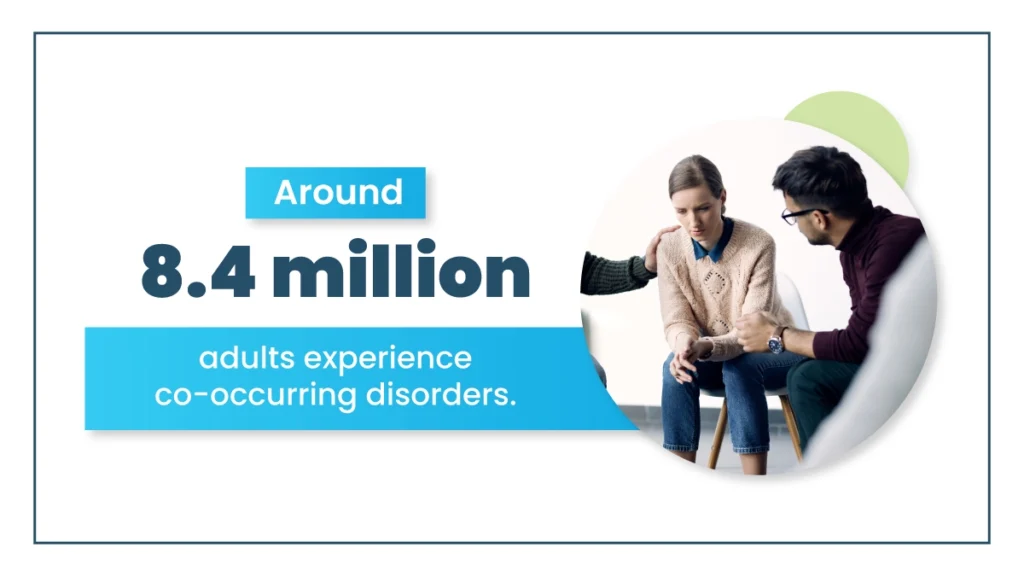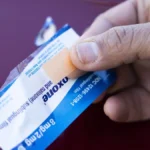If you’ve recently been diagnosed with more than one health condition, you might have heard the term “dual diagnosis.” It refers to having two or more disorders at the same time. It commonly involves a mental health issue alongside substance abuse but can involve any combination of physical or mental conditions.
It isn’t uncommon, as many people face this situation. Imagine two pieces of a puzzle fitting together. DualDiagnosis is a term that helps experts like doctors and therapists create the best plan for you.

This article delves deeper into dual diagnosis, exploring its significance, impacts, and how treatment can positively affect your overall health and recovery.
Key Takeaways
Dual-diagnosis, or co-occurring disorders, happens when a person has two or more health issues simultaneously. These conditions might be physical or mental or a mixture of the two.
- Around 8.4 million adults experience co-occurring disorders.
- Integrated treatment addresses both mental health and substance use for comprehensive healing.
- Professional guidance through counseling and therapy empowers positive changes.
The Haven Detox-Little Rock offers support to regain control over mental health challenges linked to alcohol use. Contact us at (501) 271-3342 and seek a path towards renewed well-being.
Dual-Diagnosis: What It Is
Dual-diagnosis, or co-occurring disorders, occurs when a person faces two or more health conditions simultaneously. These conditions can be physical, mental, or a combination of both.
The goal is to treat the person as a whole, recognizing that one condition can affect the other. For instance, someone dealing with anxiety might turn to substances like alcohol to cope, which can worsen their mental health. Dual diagnosis acknowledges these connections.
In the United States, around 8.4 million adults experience co-occurring disorders. It’s common and vital to treat both issues for sufficient recovery. A holistic approach, addressing mind and body, is crucial.
Integrated treatment plans are tailored to individual needs. Professionals work together to provide the proper care, including therapy, medication, and lifestyle changes.
Seeking help is a sign of strength. If you or someone you know is struggling, contact healthcare providers.
Mental Health and Substance Abuse
When mental health struggles and substance use intertwine, it’s known as co-occurring disorders or dual-diagnosis. It means facing challenges related to mental well-being while also dealing with issues concerning substance misuse.
Millions of individuals experience this combination. It’s essential to recognize that mental health and substance use are closely linked. Sometimes, people use substances to cope with emotional pain, which can worsen mental health.
Research shows that nearly half of those with a mental disorder will also experience substance use issues. Both can complicate recovery, making it essential to address both aspects.
Integrated treatment, tailored to individual needs, is the way forward. It may involve therapy, counseling, medications, and lifestyle adjustments. The goal is not just to overcome addiction but also to enhance mental well-being.
Many resources are available from healthcare providers to support groups. You’re taking the first step toward comprehensive healing by acknowledging the connection between mental health and substance abuse.
Mental Health Disorders Linked to Dual-Diagnosis
Several mental health disorders often coexist with substance misuse, forming the basis of dual diagnosis. We must learn these connections because it’s crucial for effective treatment.
Depression: Feeling persistently sad or losing interest in things can lead to using substances to cope.
Anxiety: Excessive worrying or panic attacks might drive individuals to substances for temporary relief.
Bipolar Disorder: Individuals with bipolar disorder may use substances during manic or depressive episodes.
Post-Traumatic Stress Disorder (PTSD): Trauma survivors may turn to substances to numb painful memories.
Schizophrenia: Substance use can complicate the already complex symptoms of schizophrenia.
Borderline Personality Disorder (BPD): Intense mood swings and impulsivity might lead to substance misuse.
Attention-Deficit/Hyperactivity Disorder (ADHD): People with ADHD might use substances to self-medicate.
Obsessive-Compulsive Disorder (OCD): Rituals driven by OCD can be worsened by substance use.
Around half of those with severe mental illnesses also experience substance use disorders. Integrated treatment is essential. Experts must address both conditions to ensure a sustainable recovery.
Supportive therapies, medications, and lifestyle changes play pivotal roles. Recognizing the links between mental health and substance misuse is vital to comprehensive recovery.
Diagnosis and Assessment
Diagnosing dual disorders requires a thorough evaluation by healthcare experts. This process is crucial to identify mental health and substance use issues accurately. A comprehensive assessment considers medical history, current symptoms, and their impact on daily life.
Integrated screening tools are employed to pinpoint co-occurring disorders precisely. The outcome of this meticulous diagnosis forms the foundation for designing effective treatment plans uniquely tailored to individual needs.
Within this diagnostic journey, collaboration between professionals is vital. Psychiatrists, psychologists, counselors, and medical practitioners work together to understand the individual’s health comprehensively. This multidisciplinary approach enhances the accuracy of the diagnosis and allows for a holistic perspective.
The diagnostic phase is not merely about labeling conditions but about unraveling the complexities that co-occurring disorders present. By grasping the intricacies of dual disorders, healthcare providers lay the groundwork for a successful path toward recovery and well-being.
Role of Psychiatry in Diagnosing Dual Disorders
The field of psychiatry assumes a pivotal role in diagnosing dual disorders. Psychiatrists are specialized medical doctors with expertise in mental health. Psychiatrists provide accurate diagnoses through in-depth assessments, interviews, and collaboration with other professionals.
Their proficiency enables them to comprehend the intricate interplay between mental health and substance use. This insight allows them to identify underlying causes and develop comprehensive treatment strategies.
Psychiatrists are integral to integrated care teams. Their contributions ensure a holistic approach, considering all facets of an individual’s health, ultimately leading to more effective and comprehensive recovery.
Dual-Diagnosis Treatment
Treating dual disorders requires a comprehensive approach tailored to each individual’s needs. This approach considers mental health and substance use challenges together for adequate recovery.
Integrated Care: Integrating mental health and substance use treatments ensures a holistic strategy. Professionals collaborate to address the interconnected nature of these issues.
Therapies: Therapeutic interventions, like cognitive-behavioral therapy (CBT), help individuals understand thought patterns and develop healthier coping mechanisms.
Medications: When appropriate, medications can manage symptoms of mental health disorders and support recovery.
Support Groups: Participating in support groups allows individuals to link with peers with similar experiences, fostering a sense of belonging.
Lifestyle Changes: A healthier lifestyle can positively impact mental well-being and substance use management.
Continuum of Care: Treatment isn’t a one-time event. A continuum of care offers ongoing support, preventing relapses.
Addressing drug abuse, mental health, and substance abuse problems requires specialized treatment programs. Behavioral therapy is a cornerstone, aiding those with drug addiction, alcohol addiction, and mental health conditions. Expert care tackles dual challenges for holistic recovery.
It’s essential to remember that recovery is possible. Seeking help is a sign of strength, and numerous resources are available. Individuals pave the way for a healthier, more balanced life by addressing mental health and substance use.
Importance of an Integrated Treatment Plan
An integrated treatment plan is a crucial foundation in dual-diagnosis cases. It’s designed to address mental health and substance use challenges in a unified way, leading to better outcomes.
Holistic Approach: Integrating mental health and substance use treatments acknowledges that these aspects are interconnected. This approach provides a more complete understanding of an individual’s well-being.
Comprehensive Assessment: Professionals assess various factors, such as the severity of mental health issues, the extent of substance use, and how they influence each other.
Tailored Strategies: Integrated plans are personalized to the unique needs of every individual. They increase the chances of success in managing both conditions effectively.
Collaboration: Healthcare providers collaborate closely, ensuring that treatment strategies align and support the overall goal of recovery.
Addressing Root Causes: Integrated plans aim to uncover underlying causes of co-occurring disorders, facilitating a more lasting recovery.
Long-Term Recovery: By addressing both mental health and substance use simultaneously, integrated plans contribute to sustained well-being and a reduced risk of relapse.
We must know the importance of an integrated treatment plan is a crucial step. Seeking help is a positive decision that leads to improved quality of life.
Detoxification
Detoxification, often called detox, is a crucial initial step in dual-diagnosis treatment. It’s the process of removing substances from the body under medical supervision.
Safety First: Detox is a medically supervised process to ensure safety and minimize discomfort during substance withdrawal.
Withdrawal Management: During detox, individuals may undergo withdrawal symptoms as their bodies adjust to the lack of substances.
Medical Monitoring: Healthcare professionals closely monitor individuals to manage withdrawal symptoms and address complications.
Personalized Care: Detox plans are tailored to the specific substances used and an individual’s overall health condition.
Step Towards Recovery: Detox sets the stage for further treatment by preparing individuals for therapy and counseling.
Integrated Approach: Detox is part of an integrated treatment plan that manages mental health and substance use challenges.
It’s essential to recognize that detox is not a standalone solution. It’s a stepping stone toward comprehensive recovery. The Haven Detox-Little Rock facility offers detox services as part of its holistic approach to dual-diagnosis treatment.
Counseling and Therapy
Counseling and therapy are vital components of dual-diagnosis treatment, supporting individuals in managing mental health and substance use challenges.
Safe Space: Counseling provides a safe and confidential environment for individuals to share their struggles.
Professional Guidance: Therapists trained in mental health and addiction offer expert guidance tailored to individual needs.
Understanding Triggers: Through therapy, individuals learn to identify triggers that direct substance use and forge healthier coping strategies.
Behavioral Changes: Counseling helps individuals modify behaviors leading to substance misuse, fostering positive change.
Cognitive Restructuring: Therapy addresses harmful thought patterns and replaces them with more constructive thinking.
Relapse Prevention: Therapists equip individuals with tools to prevent relapses and handle challenges.
Family Involvement: Family therapy fosters understanding and support, enhancing the recovery journey.
Counseling and therapy are essential in addressing the root causes of co-occurring disorders. They empower individuals to make healthier choices and improve their overall well-being.
Frequently Asked Questions (FAQ)
What is an example of a dual diagnosis?
An example of a dual diagnosis is someone who experiences both anxiety disorder and alcohol use disorder. In this case, the person struggles with excessive worry and fear (anxiety) alongside problematic alcohol consumption. These conditions can interact, as people might use alcohol to manage stress, but it can worsen anxiety over time.
Addressing both conditions simultaneously through integrated treatment ensures a complete approach to recovery. It focuses on improving mental health and managing substance use effectively. Such dual diagnoses require careful evaluation and personalized strategies for better well-being.
What is the meaning of dual diagnosis?
Dual diagnosis refers to two or more health conditions in one person. It often involves a mental health disorder alongside substance misuse.
These conditions can interact, influencing each other’s impact and progression. For instance, someone might have anxiety and also struggle with alcohol use.
Dual diagnosis acknowledges the complex relationship between these issues. It underscores the need to address both simultaneously for effective treatment. By targeting both mental health and substance use, integrated care offers comprehensive support to improve the overall well-being of individuals.
What is the most common dual diagnosis?
The most common dual diagnosis is the combination of depression and substance use disorder. In this case, individuals grapple with feelings of deep sadness or hopelessness (depression) alongside issues related to substance misuse. These conditions often intertwine with substances sometimes used to alleviate emotional pain.
However, substance use can exacerbate depressive symptoms over time. Addressing both aspects is crucial for effective treatment.
Integrated care strategies, including therapy and counseling, offer complete support to manage depression and substance use disorder. They promote improved well-being for individuals.
Improve Your Health With The Haven Detox-Little Rock
Are you tired of co-occurring disorders demeaning your health? Seek solace at The Haven Detox-Little Rock. Experience treatment programs like detoxification, residential care, and specialized support for effective relief from co-occurring disorders and long-term sobriety
Our advanced IV therapy and genetic testing are designed to diagnose co-occurring disorders better tailored to individual needs. Don’t let mental health disorders or substance abuse control your well-being.
Contact us at (501) 271-3342 to start your journey. The Haven Detox-Little Rock is ready to revitalize mental health convergence.



